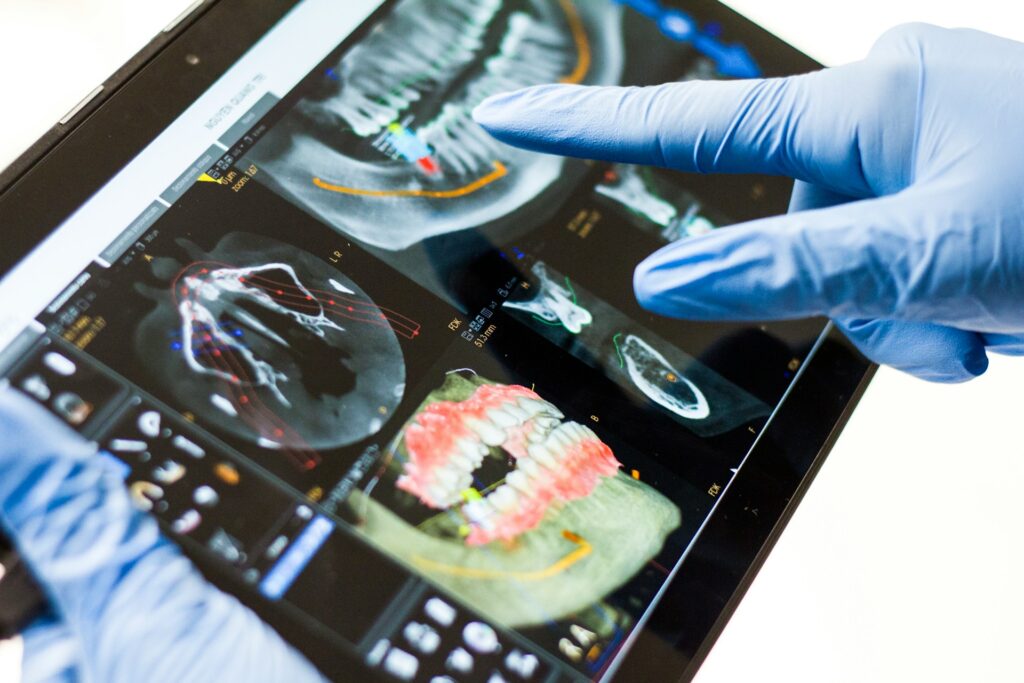Dental imaging technology has come a long way since the standard black-and-white x-ray. With CBCT scans, dentists can see a much more comprehensive picture of your teeth and supporting structures. This allows for more accurate diagnoses and more effective treatments. Let’s explore how CBCT scans compare to standard x-rays, and why so many dentists prefer this technology.
Understanding Traditional X-Rays vs. CBCT Scans in Dentistry
Full-mouth dental x-rays have been the standard dental imaging method for decades. Typically taken every 3-5 years, full-mouth x-rays capture a complete picture of your teeth, gums, and jaw. They help dentists detect cavities, examine tooth roots, and assess the strength and density of your jawbone. However, traditional x-rays are not able to provide a comprehensive view of all the oral and maxillofacial structures.
This is where CBCT imaging comes in to bridge the gap. Cone Beam Computed Tomography (CBCT) is a specialized imaging technique that uses a cone-shaped x-ray beam to capture high-resolution 3D images of the mouth, jaw, neck, ears, nose, and throat. With CBCT scans, we can capture up to 200 images from a variety of angles in less than a minute. This comprehensive view makes it much easier to diagnose oral health problems and plan effective treatments.
The Power of CBCT: 4 Reasons Why You Need More Than a Standard X-Ray
1: Precise Treatment Planning
CBCT scans generate a detailed digital model of your mouth, including the supporting bone and tissues. These scans also provide accurate measurements of your jaw that make treatments like dental implants more effective. The CBCT scans help us determine the precise location for implant placement, ensuring a comfortable fit and optimal function.
2: Lower Radiation Exposure
CBCT scans generate less radiation than full-mouth dental x-rays. The high-precision CBCT technology can focus on specific areas of interest (your mouth), limiting radiation exposure to those tissues and organs. CBCT scans also take less time, further minimizing the exposure.
3: Enhanced Diagnostic Accuracy
The high-resolution images produced by CBCT scans allow us to examine your mouth in fine detail, leading to more effective patient care. With highly detailed scans, we can detect and diagnose dental issues at an earlier stage than with traditional x-rays. Diagnosing cavities, tooth fractures, infections, and other oral issues as early as possible minimizes damage and increases the chances of saving the tooth.
4: Comprehensive Assessment
Dental CBCT scans excel in providing diagnostic scans of the oral and maxillofacial region. They can help us evaluate the health of the temporomandibular joint (TMJ), sinuses, nerve pathways, and airway structures. These detailed insights are crucial in diagnosing and treating a wide range of conditions as early as possible, from TMJ disorders to oral cancer to sleep apnea.
What to Expect
Traditional X-Rays
Compiling a set of full-mouth x-rays can take around 5 to 10 minutes, depending on how many images are needed. While you sit in a dentist’s chair, we place the x-ray machine near your mouth. We then take a series of x-ray images while you bite down on an imaging device in different positions.
CBCT Scans
Getting a CBCT scan is fast and comfortable—it typically only takes about 30 seconds. You won’t have to bite down on uncomfortable imaging devices. We will ask you to remove any metal objects that might interfere with the scans, such as jewelry, eyeglasses, and hearing aids. During the scan, all you need to do is remain still while an x-ray arm rotates around you.
*While there is very little radiation emitted during a CBCT scan, it is important that you let us know if there is any possibility you are pregnant before getting scanned.
Advanced Dental Imaging in South Jordan, Utah
If you’re due for a checkup or experiencing dental problems, contact Copper Creek Dental. Our Daybreak office is equipped with CBCT scanners and many other types of advanced dental technology that help us ensure highly accurate diagnoses and successful treatments. Give us a call at 801-280-1911 to schedule an appointment today.
Images used under creative commons license – commercial use (1/23/2024). Photo by Quang Tri NGUYEN on Unsplash

